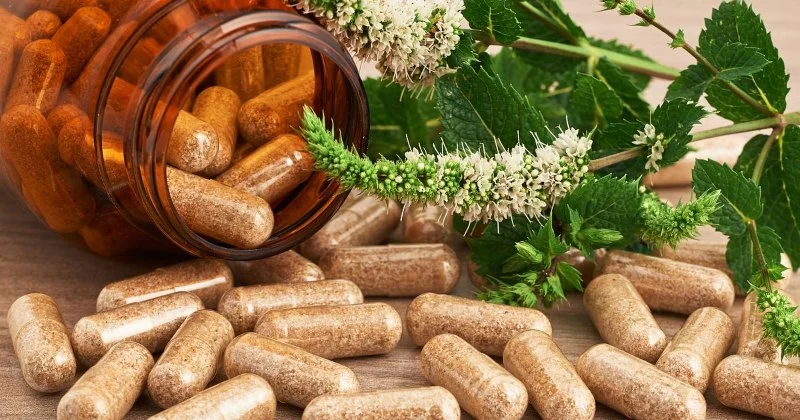- 1. The Importance of Sleep and Stress Management
- 2. Herbal Remedies for Better Sleep and Stress Relief
- 3. Best Herbal Remedies for Sleep
- 4. Herbal Solutions for Stress Management
- 5. How to Incorporate Herbal Remedies into Your Routine
- 6. Caution: Things to Know Before Using Herbal Remedies
1. The Importance of Sleep and Stress Management
Sleep and stress are two crucial aspects of our overall health. Proper sleep is essential for our physical, mental, and emotional well-being, while chronic stress can lead to various health problems, including insomnia, anxiety, and even cardiovascular issues. In our fast-paced world, it’s no wonder that many people struggle with both good sleep and effective stress management.
Managing stress and ensuring quality sleep are interconnected. Stress can often lead to restless nights, while poor sleep can worsen stress levels. In recent years, there has been a growing interest in natural ways to address these issues, with herbal remedies emerging as a popular solution. These remedies offer a more holistic approach to stress management and improving sleep without the side effects often associated with pharmaceutical options.
2. Herbal Remedies for Better Sleep and Stress Relief
Herbal remedies have been used for centuries to promote relaxation and improve sleep quality. Many herbs contain natural compounds that have calming effects on the nervous system and can help to ease the mind. These natural alternatives offer a safe and gentle way to address sleep and stress issues, without the need for prescription medications or over-the-counter sleep aids that can cause dependence.
2.1. How Herbal Remedies Work
Herbal remedies typically work by interacting with the body’s natural systems, helping to restore balance. For example, some herbs contain compounds that promote the production of neurotransmitters like serotonin and GABA, which play key roles in relaxation and sleep. Others act as mild sedatives or stress relievers, calming the nervous system and reducing physical symptoms of anxiety.
2.2. The Growing Popularity of Herbal Solutions
As people seek out natural alternatives to pharmaceutical medications, herbal remedies have seen a significant resurgence. With growing interest in wellness, mindfulness, and holistic health, more individuals are turning to plants, herbs, and teas to help them relax, sleep better, and manage stress. Additionally, herbal remedies are often less expensive and more accessible than traditional treatments, making them a popular choice for many.
3. Best Herbal Remedies for Sleep
When it comes to improving sleep, certain herbs have gained recognition for their ability to promote relaxation and support restful slumber. Here are some of the best herbal remedies for sleep that have been used for centuries.
3.1. Chamomile
Chamomile is one of the most widely known herbs for promoting better sleep. Often consumed as a tea before bedtime, chamomile contains antioxidants that help to calm the nervous system. It has a mild sedative effect that can help relax the body and mind, making it easier to fall asleep. Studies have shown that chamomile can significantly improve sleep quality and duration.
3.2. Valerian Root
Valerian root is another herb commonly used to treat insomnia and anxiety. It has been shown to have a sedative effect on the body, promoting deep and restful sleep. Valerian root is often used in herbal supplements and teas designed to alleviate sleep disturbances. However, it’s important to consult with a healthcare professional before using valerian, as it can interact with other medications.
3.3. Lavender
Lavender is renowned for its calming and relaxing properties. Whether used in aromatherapy, as an essential oil, or in a tea, lavender has been shown to reduce anxiety and improve sleep quality. The soothing scent of lavender helps lower stress levels, making it an excellent option for both sleep and stress management.
4. Herbal Solutions for Stress Management
In addition to promoting better sleep, several herbs are effective at managing stress and calming the mind. These herbs help reduce physical symptoms of stress, such as increased heart rate and muscle tension, while also promoting emotional relaxation. Here are some of the most popular herbs for stress relief:
4.1. Ashwagandha
Ashwagandha, an adaptogenic herb, is known for its ability to help the body adapt to stress. It supports the adrenal system, balancing cortisol levels and promoting a sense of calm. Studies have shown that ashwagandha can reduce symptoms of anxiety and stress, making it a popular choice for those dealing with chronic stress.
4.2. Lemon Balm
Lemon balm is a member of the mint family and has been traditionally used to ease stress and anxiety. Known for its calming effects, lemon balm has been shown to help improve mood, reduce nervousness, and promote a sense of calm. It is commonly used in teas, tinctures, and capsules.
4.3. Passionflower
Passionflower is often used as a natural remedy for anxiety and insomnia. It is believed to increase the levels of gamma-aminobutyric acid (GABA) in the brain, which helps to calm the mind and reduce stress. Passionflower is frequently found in sleep and relaxation supplements and can be taken as a tea or in pill form.
5. How to Incorporate Herbal Remedies into Your Routine
Incorporating herbal remedies into your daily routine can be simple and effective. Whether you’re looking to manage stress during the day or improve your sleep at night, there are various ways to introduce these herbs into your lifestyle.
5.1. Herbal Teas
Herbal teas are one of the easiest and most enjoyable ways to use herbal remedies. Teas made from chamomile, lemon balm, and valerian root can be part of your evening routine, helping you unwind before bedtime. Drinking a cup of herbal tea can signal to your body that it’s time to relax and prepare for sleep.
5.2. Supplements
Herbal supplements, such as capsules or tinctures, offer a more concentrated form of the herbs that can be easier to incorporate into your routine. If you have trouble sleeping or are under chronic stress, herbal supplements can provide relief throughout the day or night.
5.3. Aromatherapy
Essential oils, like lavender and chamomile, can be used in aromatherapy to reduce stress and improve sleep. Diffusing essential oils in your bedroom or applying them to your skin before bed can have a calming effect on your nervous system, helping you unwind and prepare for restful sleep.
6. Caution: Things to Know Before Using Herbal Remedies
While herbal remedies can be effective, it’s important to approach them with caution. Not all herbs are suitable for everyone, and some may interact with medications or cause side effects. Before using any herbal remedy, especially if you are pregnant, nursing, or have pre-existing health conditions, it’s essential to consult with a healthcare provider.
Additionally, not all herbs are regulated by the FDA, so it’s crucial to purchase herbal supplements from reputable sources. Always follow dosage recommendations and be mindful of any adverse reactions.





















